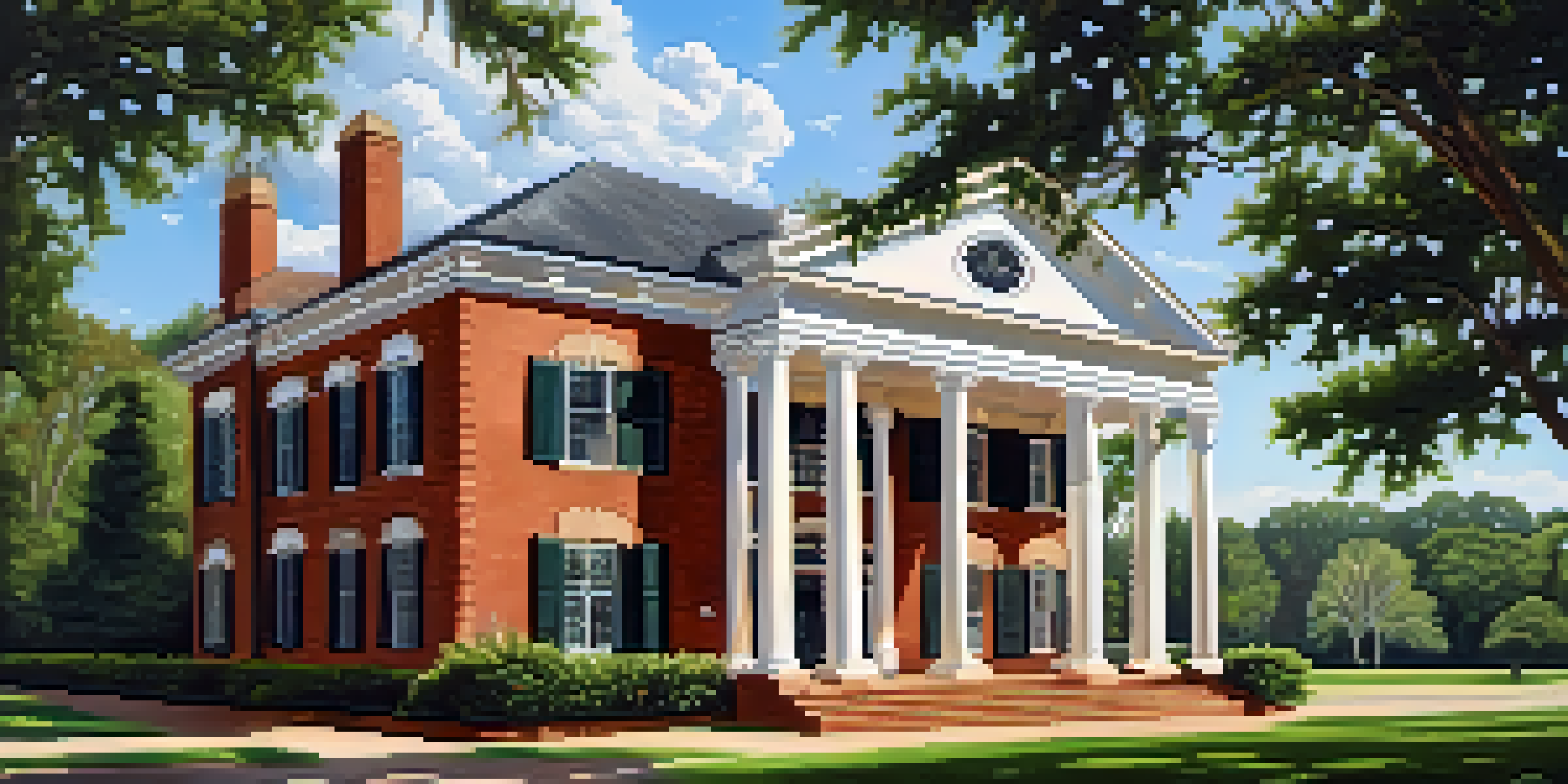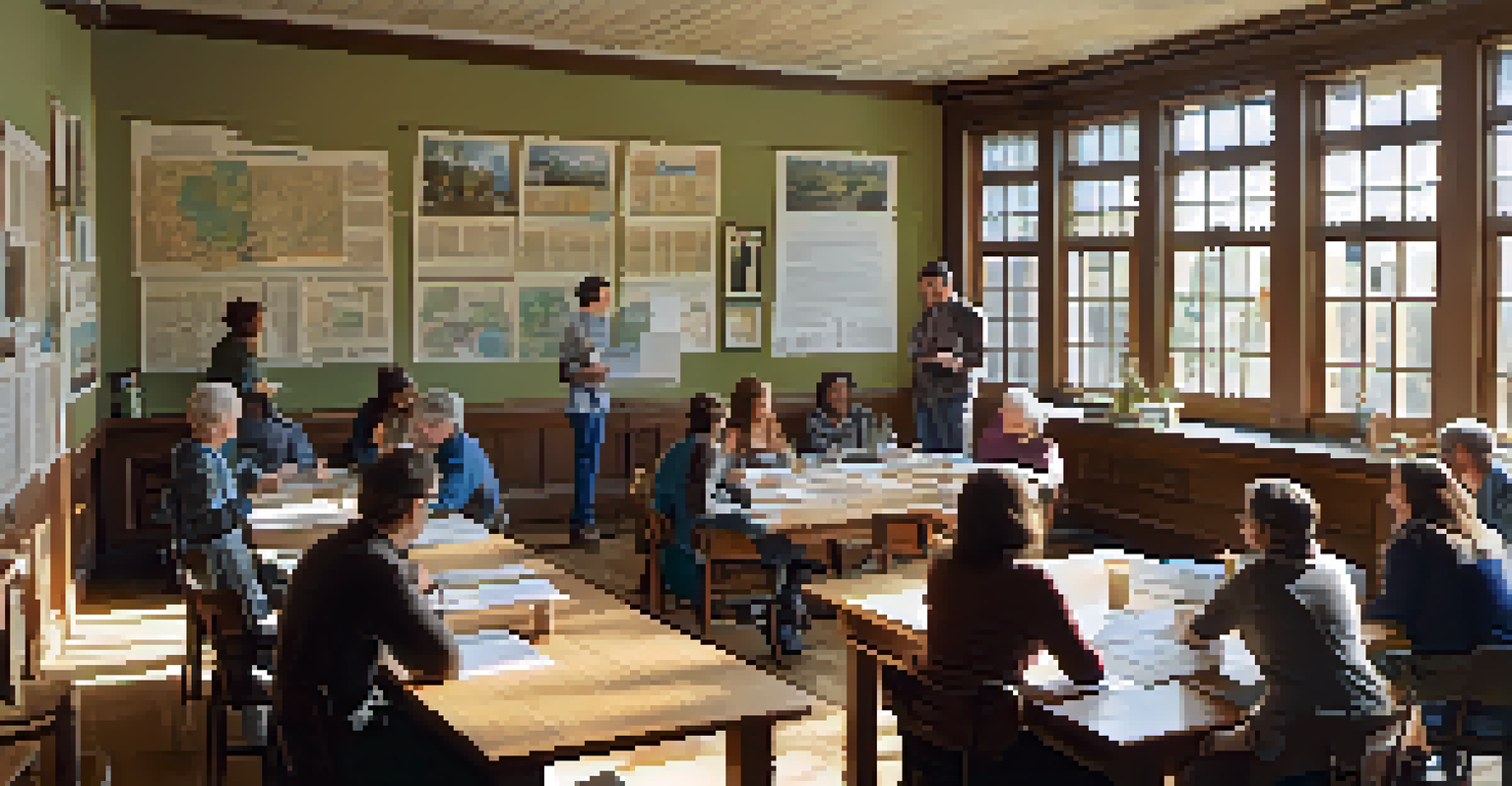Legislation Supporting Historical Preservation in Georgia

Overview of Historical Preservation Legislation in Georgia
Georgia has a rich tapestry of history, and preserving it is crucial. The state has enacted various laws aimed at protecting historical sites and buildings. These legislative efforts not only safeguard our heritage but also enhance community pride and tourism.
Preservation is a state of mind, and it’s our duty to keep our history alive for future generations.
The Georgia Historic Preservation Act is a cornerstone of these efforts, providing incentives for the restoration and maintenance of historically significant structures. This law encourages both public and private entities to engage in preservation activities.
Moreover, local governments often develop their own ordinances to support these state-level initiatives, ensuring that the unique history of each community is celebrated and protected.
Key Laws Supporting Historical Sites in Georgia
One of the key pieces of legislation is the Georgia Historic Preservation Act, which offers tax incentives for property owners. This law not only encourages preservation but also stimulates economic development in local areas. By making it financially feasible, it attracts more individuals and organizations to invest in historical properties.

Additionally, the National Historic Preservation Act plays a significant role, as it provides a framework for recognizing and protecting historic places. Georgia benefits from this federal support, allowing the state to receive grants for preservation projects.
Key Laws Enhance Preservation Efforts
The Georgia Historic Preservation Act and local ordinances create a robust framework that encourages the restoration of historic sites and stimulates community pride.
These laws work together to create a robust framework that not only protects physical structures but also fosters a sense of identity and continuity within communities.
The Role of the Georgia Historic Preservation Division
The Georgia Historic Preservation Division is instrumental in implementing preservation laws. This division offers guidance, resources, and support to communities looking to protect their historical assets. Through various programs, they help identify, evaluate, and preserve sites of historical significance.
History is not a burden on the memory but an illumination of the soul.
They also manage the Georgia Register of Historic Places, which helps raise awareness about the importance of preservation. Being listed not only honors the site but can also provide eligibility for various grants and tax incentives.
Through educational outreach and partnerships, the division actively engages with the public, encouraging community involvement in preservation efforts.
Incentives for Property Owners to Preserve History
Incentives play a crucial role in motivating property owners to engage in preservation. Through tax credits and grants, the state makes it financially viable for owners to maintain or restore their historic properties. These incentives can significantly reduce the cost burden associated with restoration projects.
For instance, the Georgia State Income Tax Credit for rehabilitating historic structures can cover up to 25% of the rehabilitation costs. This financial boost encourages investment in preservation, which is vital for maintaining the integrity of historical sites.
Incentives Drive Property Owner Action
Financial incentives, such as tax credits, significantly motivate property owners to invest in maintaining and restoring their historic properties.
Ultimately, these incentives not only benefit property owners but also enrich the community by preserving its historical narrative.
Local Preservation Ordinances and Their Impact
Local preservation ordinances are essential in complementing state laws. Many cities and counties in Georgia have adopted their own regulations to protect local heritage. These ordinances often establish historic districts, which help maintain the character and charm of neighborhoods.
For example, cities like Savannah and Athens have implemented stringent guidelines for renovations in historic districts. Such measures ensure that any new construction or modifications respect the historical context of the area.
By allowing local governments to tailor preservation efforts, these ordinances help foster a unique sense of place and community identity.
Challenges Facing Historical Preservation in Georgia
Despite strong legislative support, historical preservation in Georgia faces challenges. Urban development pressures can often lead to the demolition of historic buildings in favor of new construction. This conflict highlights the need for continued advocacy and community involvement in preservation efforts.
Moreover, funding can be inconsistent, making it difficult to sustain long-term preservation projects. While tax incentives exist, they may not fully cover the costs, leading to financial strain on property owners.
Community Engagement is Essential
Active community involvement fosters a deeper connection to local history and strengthens preservation efforts through grassroots support and advocacy.
Addressing these challenges requires a collaborative approach, bringing together government, non-profits, and community members to advocate for the preservation of Georgia's rich history.
Community Engagement in Preservation Efforts
Community involvement is vital for successful historical preservation. Local organizations often rally volunteers to help maintain historical sites, run events, and raise awareness about the importance of preservation. This grassroots approach fosters a deeper connection between residents and their community's history.
Engaging the public through educational programs can spark interest in local heritage. Workshops, tours, and lectures provide opportunities for individuals to learn about the significance of their historical sites and how to protect them.

Ultimately, when communities come together to advocate for preservation, they not only protect their history but also enrich the cultural fabric of their region.